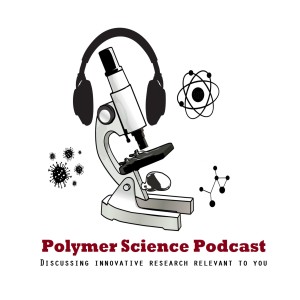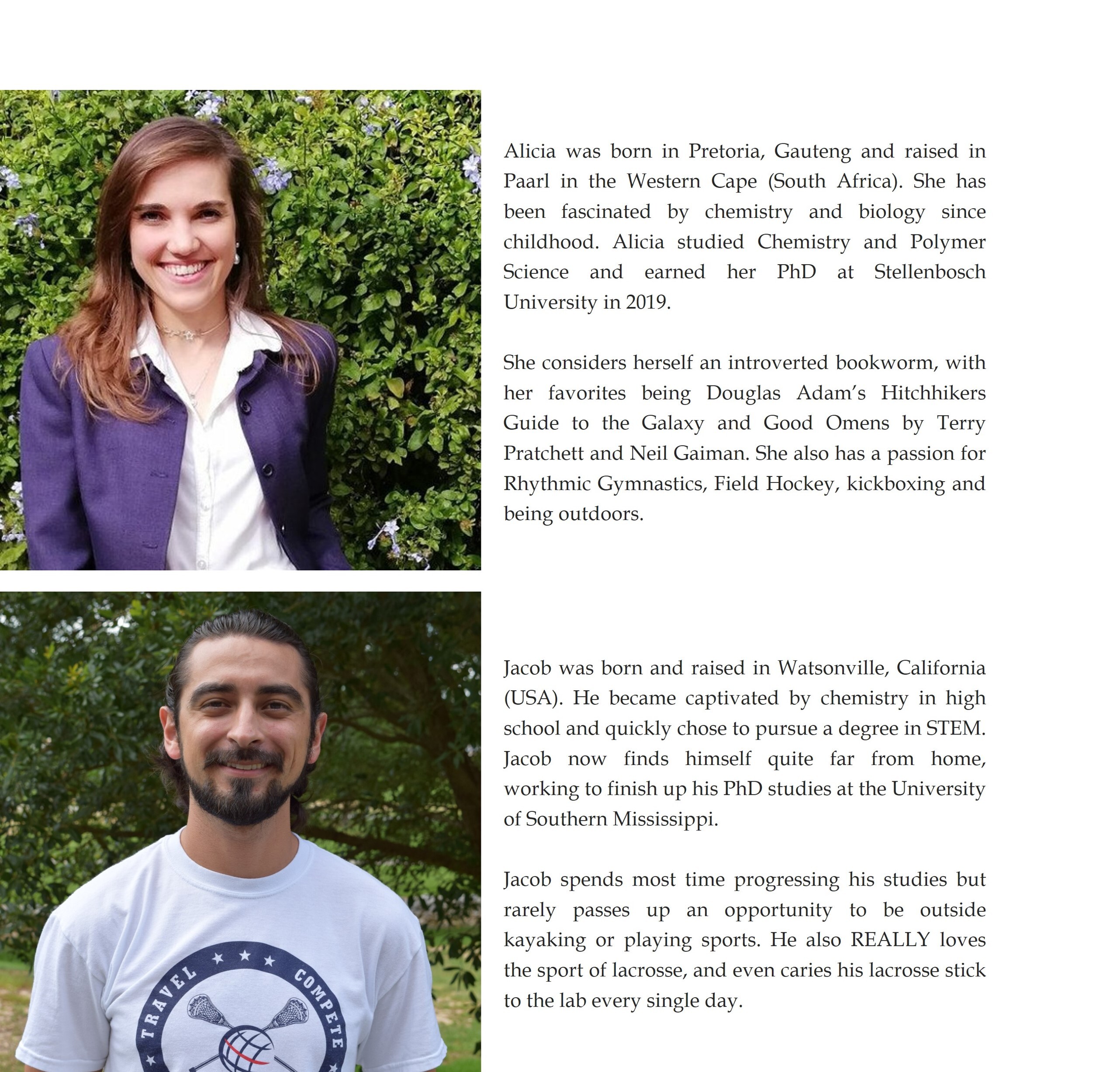Polymer Science Podcast
Two scientists from opposite ends of the Earth speak with researchers around the world to break down their fascinating work in polymer science, chemistry, material science, and engineering. Join Dr. Alicia Botes and Jacob Schekman as they break down exciting discoveries on the Polymer Science Podcast! Questions or comments? Contact us at polymersciencepodcast@gmail.com
Two scientists from opposite ends of the Earth speak with researchers around the world to break down their fascinating work in polymer science, chemistry, material science, and engineering. Join Dr. Alicia Botes and Jacob Schekman as they break down exciting discoveries on the Polymer Science Podcast! Questions or comments? Contact us at polymersciencepodcast@gmail.com
Episodes

Saturday Nov 27, 2021
Saturday Nov 27, 2021
My co-host Jacob Schekman and I had our very first interview as a duo!
Together, we had a very enlightening conversation with Dr Monika Snowdon about her PhD work, the projects she is currently busy with, and we learned more about her very own Podcast show, called the IMNano podcast, which she hosts with her co-host, Irfani!
Monika obtained her doctorate in chemistry from the University of Waterloo. Part of her doctoral research was pursued at the National Institute for Material Science in Japan at the soft materials chemistry group under the supervision of Dr. Dai-Ming Tang. She is passionate about making nanoscience and technology more accessible to a wider audience; this drive led to the creation of the nanotechnology podcast which is all about translating cutting-edge research and its applications to society.
Please follow the links below to find out more about Monica and her work:
Podcast Website: https://www.imnano.org/about
LinkedIn: https://www.linkedin.com/in/monikasnow/
Thank you for listening!

Sunday Oct 31, 2021
Episode 17: Talking to Dr. John Pojman about QuickCure Clay
Sunday Oct 31, 2021
Sunday Oct 31, 2021
In this episode, Dr. Pojman talks with Jacob about the unique reaction properties of frontal polymerization and the serendipity within his research that led to his production and international distribution of QuickCure Clay. Pojman Polymer Products, LLC, licensed QuickCure Clay to Ranger industries, which produces and distributes the material around the world. No mixing, no kiln… just mold and heat a part of your beautiful sculpture to begin the cure process, wait a few minutes a then get to painting! Dr. John Pojman is also a professor of chemistry at Louisiana State University. Tune in now for a fun conversation on polymers in art and some fascinating lessons in art history.
Please click on the links below to find out more:
Pojman Polymer Products: http://pojman.com/3pllc/3pllc.html
Examples of artist’s creations using Pojman’s “QuickCure Clay”:
https://rangerink.com/blogs/projects/tagged/quickcure-clay
A brief how-to on working with “Quick-cure clay”
https://rangerink.com/blogs/blog/ranger-101-quickcure-clay
Let us know what you think of this episode by emailing to polymersciencepodcast@gmail.com.
Check out our website:
https://polymersciencepodcast.podbean.com/
Thank you for listening!!

Friday Sep 24, 2021
Friday Sep 24, 2021
Today is a special episode where I catch up with an old Stellenbosch University colleague of mine, Dr Jacquin October. He is a very impressive and dedicated Postdoctoral Researcher at Max Planck Institute for Chemical Energy Conversion. We talked about his move from South Africa to Germany and what that entails. We also discussed the applications and necessity for studies from his previous Ph.D. work concerning Alkylation of amines and the synthesis and characterization of novel rhodium and ruthenium-based iminopyridyl complexes.
You can learn more about his work in the links below:
https://www.linkedin.com/in/jacquin-october-9462b1b1/
https://www.researchgate.net/profile/Jacquin-October
https://www.cec.mpg.de/de/mpi-fuer-chemische-energiekonversion
Thank you for listening!!

Sunday Aug 15, 2021
Episode 15: Talking to Prof James Pikul about Metallic Wood
Sunday Aug 15, 2021
Sunday Aug 15, 2021
It is a week after the Closing Ceremony of the 2020 Tokyo Olympic games, and it is amazing to be able to reflect on the revolutionary technology that we currently have available due to the dedicated mechanical engineers and scientists that are focusing their efforts on providing sustainable and convenient tools to improve society. In Japan, we saw the effective use of bullet trains for quick transport between stadiums, multilingual robotic guides and security guards. The Olympic medals were made of recycled laptops and other electronic devices while self-steering cars have been giving the competitors lifts to their destinations. Viewers even got to see the amazing performances of our athletes from every angle with advanced 3D video capturing technology.
It is therefor only fitting that we are talking to Mechanical Engineering Professor, James Pikul, in this episode about designing metallic wood and the interesting roles that polymers play in improving technology and studies in the Mechanical Engineering field.
James Pikul is an Assistant Professor and a Moore Inventor Fellow in Mechanical Engineering and Applied Mechanics from the University of Pennsylvania. He is the lead of the Pikul Research Group and seeks to make transformative advances in energy storage, energy conversion, multifunctional materials, and robotics by understanding and exploiting nanoscale to macroscopic characteristics of electrochemistry and soft matter. He graduated at the University of Illinois Urbana-Champaign where he worked on fabricating high power microbatteries and high strength cellular metals. He received a 2020 Moore Inventor Fellowship as well as a 2020 Toyota Programmable System Innovation Fellowship and several awards for his research.
You can find out more about him by following this link:
https://www.linkedin.com/in/james-pikul-25905a13/
Hope you enjoy!

Thursday Aug 05, 2021
Episode 14: Talking to Maliha Syed about Polymers in Cosmetics
Thursday Aug 05, 2021
Thursday Aug 05, 2021
Dr Maliha Syed studied at the University of Southern Mississippi and graduated with her PhD in Polymer Science and Engineering. She is a Principle Scientist for the company called Avlon which focuses on synergizing health, beauty, and polymer science to provide skincare solutions that enhance consumer wellness. Maliha talks to us about hair, nail and skin care and the development strategies behind each product. She helps us understand how polymers are essential in the production of these cosmetics and how the design is optimized for each product application.
You can find out more about her and Avlon here:
https://www.linkedin.com/in/drmalihasyed/
and
https://avlon.com/
Please let us know what you think of this podcast and feel free to send a comment or any suggestions to the Polymer Science Podcast email address:
polymersciencepodcast@gmail.com
Thank you for listening!

Sunday Jun 27, 2021
Episode 13: Talking to Prof. James Rawlins about Polymer Coatings
Sunday Jun 27, 2021
Sunday Jun 27, 2021
Today's episode features Prof. James Rawlins from the University of Southern Mississippi where he focusses his research on structure properties and structure performance relationships of polymer coatings and early detection of corrosion.
Coatings are predominant in our every day life and is used in corrosion control, as decorative covering or even for modifying surfaces to make it more hydrophobic (fabric protectors) or give it antimicrobial properties.
Prof. Rawlins talks candidly about life as a scientist and gives insight and advice on how to approach research projects. He also delves further into fundamentals of coatings so that young researchers that are interested in a career or further research in Polymer coatings can know what to expect.
You can find out more about Prof. James Rawlins by following this link:
https://waterbornesymposium.sched.com/artist/jamesrawlins
Thank you for listening and your continuous support!

Thursday May 20, 2021
Thursday May 20, 2021
Thomas Mortelmans is a PhD student with a passion for Polymers. He talks about how he combines various scientific fields and state-of-the-art nanofabrication techniques for bio-medically relevant applications. He is working on the development of a nanofluidic device, which would be capable of interpreting pathophysiological mechanisms of neurodegenerative diseases. The project is a collaboration between the Laboratory of Micro-and Nanotechnology (LMN) at the Paul Scherrer Institute and the Center for Cellular Imaging and NanoAnalytics (C-CINA) at the University of Basel.
You can find him on LinkedIn:
https://www.linkedin.com/in/thomas-mortelmans-066a9a83/He also created his own Gin, inspired by his scientific. It is available in Belgium and is known as ‘Cloudy Gins', All IncMist. You can have a look by following this link:
https://www.the-spiritists.be/english2/all-inc-mist-gin-40-500ml.html
Also linked as promised, the Two Photon Polymerizations 3D printing images of the Eiffel Tower and more:
https://www.researchgate.net/publication/287124439_Art_on_the_Nanoscale_and_Beyond/figures?lo=1&utm_source=google&utm_medium=organic
Thank you for listening!

Wednesday Apr 21, 2021
Episode 11: Talking to Dr. Danielle Pretorius about Fabricating cardiac tissue patches
Wednesday Apr 21, 2021
Wednesday Apr 21, 2021
Dr. Danielle Pretorius has earned her PhD in Biomedical Engineering at the University of Alabama at Birmingham. Together with Dr. Jay Zhang, she is helping to fabricate cardiac tissue patches that is made from human-induced pluripotent stem cell-derived cells. The initial structures were made with fibrin but due to the dynamic nature of the cells, the extracellular matrix of these cells could be remodeled. Danielle and her group's fabrications process has allowed them to achieve previously unseen tissue thickness with minimal necrosis, the ability to match viscoelasticity properties to those seen in native left ventricular tissue as well as phenomenal conduction velocities throughout the structures.
You can find out more about Dr. Pretorius and her work in this link:
https://www.linkedin.com/in/dani%C3%ABlle-pretorius-b93280b5/
Thank you for listening!
Please feel free to contact us at the email below:
polymersciencepodcast@gmail.com

Sunday Mar 14, 2021
Sunday Mar 14, 2021
In this Episode we speak to Prof Stachewicz from the AGH University of Science and Technology about two topics that revolve around Bioengineered Electrospun fibers. We first talk about a Water Harvesting system using Polystyrene-Cellulose electrospun fibers. She describes the specific electrospinning process required for the development of "gutter" shaped fibers for these water collection devices in poor or under-developed communities. In the second topic we learn more about Eczema and how the treatment for this disease is being investigated and modified. Prof Ula and her group have developed electrospun patches that can behave as an oil carrier to sooth the irritated skin.
You can have a look at all the work that has been discussed here:
https://www.researchgate.net/profile/Urszula-Stachewicz
https://www.linkedin.com/in/urszula-stachewicz-387b5a1/?originalSubdomain=uk
Thank you for listening!

Saturday Feb 20, 2021
Saturday Feb 20, 2021
This episode is filled with information about the engineering and characterization of Exosome-Polymer hybrids. Dr. Upenyu Muza explains to us what exosomes are and how they can be modified and improved for the use in targeted drug delivery and for other medicinal applications by using polymers. He also gives us a detailed description of a very important separation technique called Field Flow Fractionation and how they adjust it to the requirements of their study of Exosome-Polymer hybrids.
I hope you enjoy our talk as much as I did. Please share and give a review if you enjoyed this episode and feel free to leave us a comment.
You can check out the work that was done by Dr. Muza and his team:
https://www.researchgate.net/profile/Upenyu-Muza
https://www.cmu.edu/mcs/news-events/2021/0104_exosome-polymer-hybrids.html
We would love to hear from you:
polymersciencepodcast@gmail.com

POLYMER SCIENCE PODCAST
Here to break down the science so you don't have to are your hosts, Dr. Alicia Botes and Jacob Schekman. Alicia received her PhD in Chemistry and Polymer Science at the University of Stellenbosch, South Africa, and is currently working as an electron microscope analyst at the Central Analytical Facility. Jacob is a PhD candidate in Polymer Science and Engineering at the University of Southern Mississippi, United States.
Do you enjoy learning about science? Then this podcast is just for you! Polymers are a unique category of molecules, special for their large size and seemingly endless potential for application in our world. In fact, polymers already have HUGE impacts on our lives... Can you guess which of your household items are made from polymers? Shoes? Made from polymers. Paper? That's a polymer. Spaghetti? Yeah, that too. Literally ALL types of paint? You got it, all polymers!
Of course, polymer research is pertinent to far more than just household products. On this show you'll hear from scientists whose research contributes to improved recycling, aerospace materials, soft robotics, medical equipment, biocompatible plastics, biodegradable plastics, textiles, packaging, and so much more!
We hope you enjoy listening and learning with us!





